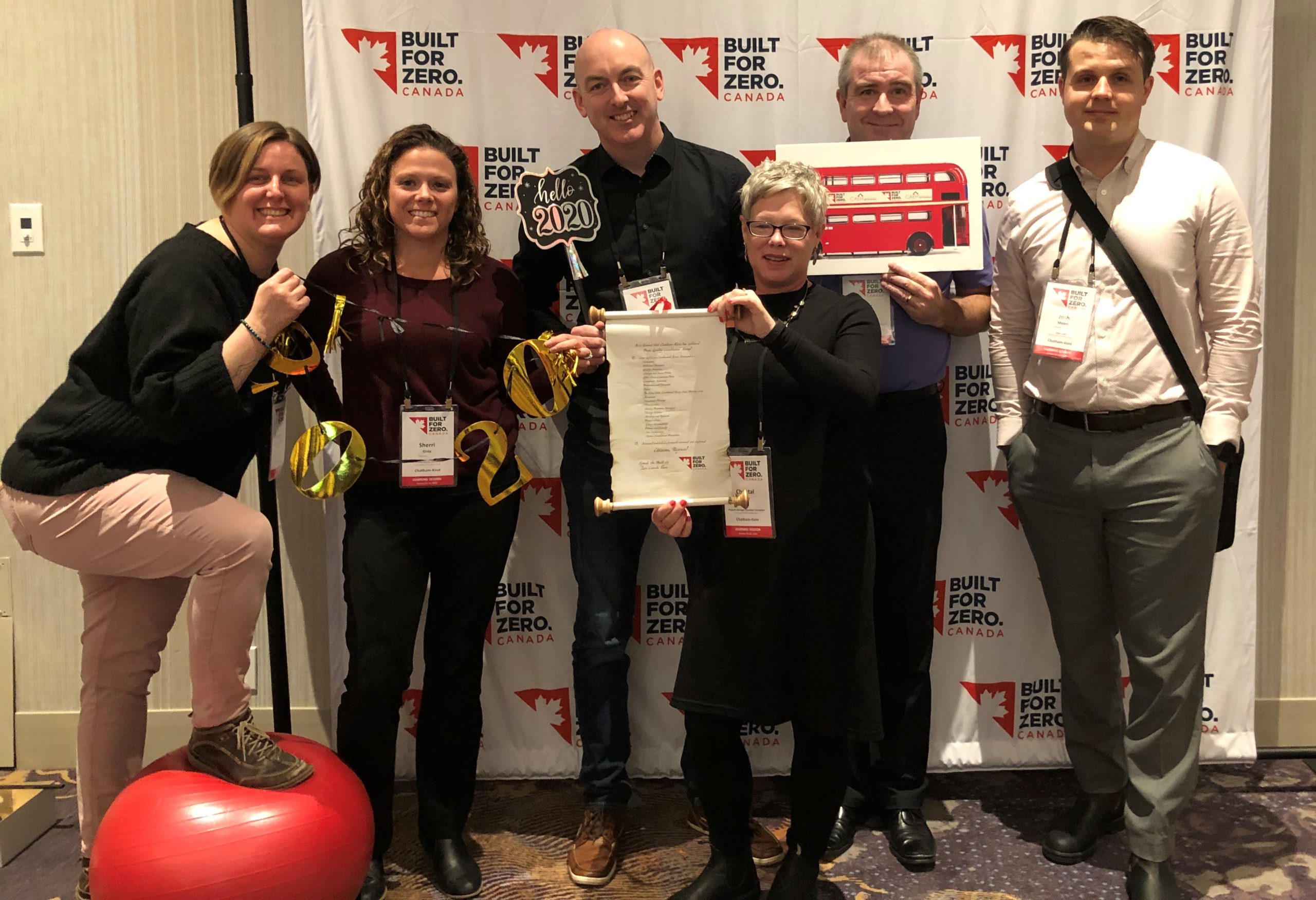Chatham-Kent has adapted to COVID-19 with an isolation shelter and new prioritization measures to move people quickly into housing. This blog is a part of our Bright Spot series highlighting outstanding work in ending homelessness happening across Canada.
 Amid a global health pandemic, Chatham-Kent is using its COVID-19 shelter space for people experiencing homelessness as a bridge to housing. The Southwestern Ontario municipality is remaining housing-focused in its efforts to end homelessness.
Amid a global health pandemic, Chatham-Kent is using its COVID-19 shelter space for people experiencing homelessness as a bridge to housing. The Southwestern Ontario municipality is remaining housing-focused in its efforts to end homelessness.
When COVID-19 hit Canada in early March and began dominating the airwaves, Chatham-Kent’s homelessness prevention team acted quickly by expanding the use of motels to increase capacity. But it wasn’t enough. The team decided to open a temporary COVID-19 isolation shelter that would meet and exceed all Public Health requirements, according to Josh Myers, acting Program Manager, Employment & Social Services for the Municipality of Chatham-Kent.
The Built for Zero Canada community chose its John D. Bradley Convention Centre as the shelter site to maximize social distancing while ensuring they had enough beds for everyone that needed to isolate. They did this quickly by redeploying staff to assist in operating the shelter.
Now the shelter and motels are being utilized as a bridge to housing and supports. Although it opened its doors just a couple weeks ago, the temporary isolation shelter has already helped dozens of people in need during COVID-19.
“We maintain that the only way to end homelessness is through housing,” says Josh. “COVID-19, for all the negative impact that it is having, has given us an opportunity to work closer and more intensely with our homeless population by having a coordinated emergency response and one point of entry into emergency sheltering.”
While the emergency shelter was launched in reaction to COVID-19, the team didn’t want to slow down because, historically, Chatham-Kent has been “very successful in securing a high number of housing placements each month,” Josh says.
“Unfortunately, COVID-19 has severely reduced the number of vacant units being advertised,” he adds. “This means that not only are we seeing an increase in our newly homeless, but we’re not seeing our exits to housing so in total the number of people experiencing homelessness will continue to increase.
“We can’t let that happen, so finding new ways to secure housing is at the top of our priorities.”
Shelter as a bridge to housing
Through strong partnerships with the Canadian Mental Health Association, Chatham-Kent Health Alliance, Employment and Social Services, Chatham-Kent Public Health Unit and other community partners the team has transformed the shelter into a place where people can “access services to support the connection back to housing.”
“We have a highly successful Rapid Rehousing Program that has contributed to our high number of monthly housing placements,” Josh says. “This program is continuing and expanding as we work to prioritize any and all available units in the community to quickly move people to housing.”
 While the team works to adapt to the new housing market and the new challenges it will bring for some who need housing, they’re using that time to build rapport with clients to better connect them to housing.
While the team works to adapt to the new housing market and the new challenges it will bring for some who need housing, they’re using that time to build rapport with clients to better connect them to housing.
“Our goal is to have these supports follow them to housing as soon as it is secured,” Josh says. “We are focused on housing as soon as possible, while providing services that may speed up the time to housing.”
Shelter to housing process
Everyone who is homeless is first screened for motel stay. Motels are prioritized for families and those more vulnerable to COVID-19. Whether someone is at a motel or in the shelter, the supports offered to them are the same.
What is critical and unique to Chatham-Kent’s approach is residents are assigned a Housing Support worker the first day, who is responsible for coordinating services, completing assessments, and assisting with getting folks document ready for housing. This is recorded via HIFIS to easily prioritize people based on need. The worker meets with the client once a week (at minimum) until they are accepted to another program or secure housing.
Chatham Kent’s Coordinated Access table is now meeting twice a week to discuss services and connect people to programming or housing.
Before COVID-19, top priorities had been chronicity when matching folks to programs. All newly identified, non-chronic individuals were added to their By-Name List but were not typically brought up at Coordinated Access, which focused on access to housing with support. They would instead receive immediate lighter housing support via Rapid Rehousing.
But now that available units are in the low single digits, that had to change.
Prioritization has now shifted to reducing the risk of an outbreak, and one way to do that is to have less people in a congregate setting. Housing is being prioritized to move the greatest number of people out of shelter as quickly as possible. But, in doing so, they remain focused on their mission to house people and end chronic homelessness.
“We are a small but effective team,” he says. “Anyone reading this knows that this work is not easy, but the reward of that first housing placement is all the motivation we need.”
Bias for action
As a Built for Zero Canada community, Josh says one of the most important lessons from the campaign is that it doesn’t matter how many emergency beds you have, you will never have enough if you can’t move people to housing. And their monthly inflow and outflow data backs that up.
“This shelter along with our motel capacity is a result of a substantial increase in individuals returning to homelessness because COVID-19 has made couch-surfing dangerous,” he adds. “If we don’t remain focused on housing, then we will soon run out of capacity to safely house individuals at the shelter and motels.
“We have learned a hard and painful lesson of how pandemics impact the most vulnerable in our community.”
Chatham-Kent is committed to adapting to the pandemic as it unfolds and is more mission-focused than ever. When the housing market opens, the team will continue to prioritize housing people so that in an ideal scenario, when the next outbreak happens, they won’t need a shelter.
